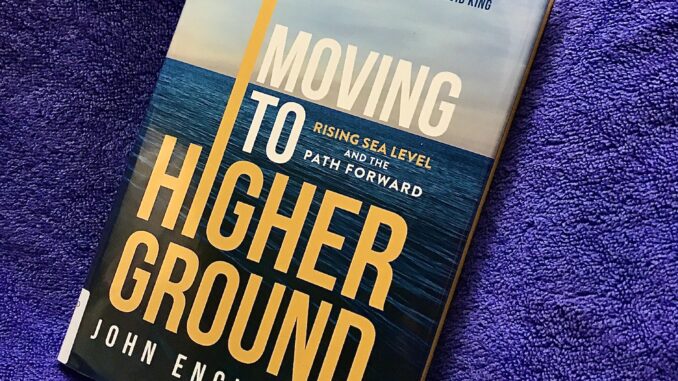
By John Englander
Hardcover, 223 pages, 2021.
Girl Friday Productions
“Even if we could immediately stop all carbon dioxide emissions and the warming, the excess heat stored in the sea will continue to melt the ice sheets for centuries, raising global sea level to heights unknown for the past hundred thousand years.”
John is a renowned oceanographer and expert on climate change and sea level rise (SLR). He says SLR is unstoppable and we cannot precisely predict its rate of rise, which can be sudden and surprising.
He explains environmental definitions: climate change; global warming; carbon versus carbon dioxide; plastics and recycling; and ice melt. He clears up the confusion of carbon, which affects air pollution, and carbon dioxide, which largely causes global warming.
Neither can recycling reduce global warming and SLR.
“We could recycle everything possible and eliminate all present and future plastics in the sea without any noticeable effect on the planet’s average temperature, the rate of ice melting, and the sea level rising.”
We need a global concerted environmental effort to slow SLR.
John mentions the most vulnerable US cities and countries (Indonesia, Singapore, Venice, the Netherlands) and suggests adaptive structures that nations and communities can take to prepare for SLR and minimize its destruction. It takes a huge investment and requires the mobilization of everyone in all sectors. It starts with education so we can intelligently assess our risks.
“If the engineers, architects, lawyers, and financial community do not understand the issues of long-term SLR, we will not develop good adaptations. We simply cannot afford to waste money and time on misguided shortsighted efforts.”
But not everyone thinks SLR is a threat.
“It’s hard to grasp the facts of unstoppable rising sea level for several reasons: It is without precedent in the human experience; it will be unimaginably disruptive; and, perhaps most importantly, there is a yawning chasm between the slowness of the perceived change and the urgent need for bold and durable solutions.”
We need to act now before SLR happens: educate, advocate, legislate, regulate, elevate, isolate water, relocate to higher ground, and innovate.
“As with anticipating earthquakes or pandemics, we need to plan for rising sea level and flooding without knowing the specific timing or the magnitude. While that may seem overly cautious, we fully accept unpredictability when it comes to planning for other risks.”
This should be required reading for all societies because we will all be affected by SLR—not just low lands and coasts.
“Hoping or pretending that sea level will not rise is irresponsible.”
